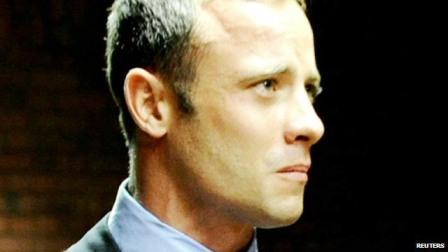PRETORIA, (Reuters) – The lead detective in ‘Blade Runner’ Oscar Pistorius’ murder investigation was taken off the case today after it emerged he was facing seven attempted murder charges for opening fire on a minibus full of passengers.
Citing chief of police Riah Phiyega, local media said Hilton Botha, who endured a torrid time on the stand at the Paralympic and Olympic track star’s bail hearing this week, had been removed from the case pending an internal police probe.

He has not been suspended from the police, the reports said.
Charges against Botha over the 2011 shooting were initially dropped but the National Prosecuting Authority told Reuters they were reinstated on Feb. 4 – 10 days before Pistorius shot girlfriend Reeva Steenkamp in his Pretoria home.
“The decision to reinstate was taken on Feb. 4, way before the issue of Pistorius came to light or the murder of Reeva was committed,” NPA spokesman Medupe Simasiku told Reuters. “It’s completely unrelated to this trial.”
Phiyega said she did not know why the charges were reinstated.
It is also unclear how the latest twist in Pistorius’s dramatic four-day bail hearing will affect the athlete’s chances of securing release from custody pending his trial.
At the time of the taxi bus shooting, Botha – a detective with 24 years on the force – was chasing a man accused of murdering a woman and disposing of her dismembered body down a drain, local media said.
Pistorius, a double amputee dubbed “Blade Runner” because of his carbon fibre racing blades, faces life in prison if convicted of the premeditated murder of Steenkamp in the early hours of Valentine’s Day.
Sportswear giant Nike, which uses the famous “swoosh” logo, froze its contract with Pistorius today saying the athelete should be “afforded due process”.
Other companies with sponsorship deals, including British telecoms firm BT, U.S. sunglasses maker Oakley and French designer Thierry Mugler, have declined to comment on their contracts while Pistorius’ bail hearing is taking place.
The hearing in Pretoria was adjourned at 1400 GMT and will restart on Friday morning, when a decision is expected.
POLICE UNDER PRESSURE
The revelations about Botha capped a troubling 24 hours for South Africa’s prosecution service.
Under cross-examination at the hearing on Wednesday, the detective was accused of contaminating the crime scene in Pistorius’s house and had to backtrack on details such as the distance of witnesses from the athlete’s home.
Grilled by lead defence counsel Barry Roux, he also had to concede that Pistorius’s version of events – that he fired into the toilet door in a blind panic thinking an intruder was lurking behind it – was plausible.
“The poor quality of evidence presented by the chief investigating officer exposed disastrous shortcomings in the state’s case.” Roux said in arguing for Pistorius’ release.
The 26-year-old runner denies murder and was more composed in court after repeatedly breaking down in previous hearings.
His uncle, Arnold Pistorius, said his nephew was eating again after consuming nothing for six days and had spent much of his time in police custody reading the Bible.
A full trial is likely to take many months, and even if he is acquitted, Pistorius faces a huge challenge to rebuild his career and image in the eyes of the millions around the world who saw him as the epitome of triumph over adversity.
Prosecutor Gerrie Nel tried to recapture the initiative, reminding the court of the seriousness of the charges facing Pistorius.
“His actions are indicative of a man who was willing and ready to kill,” Nel said. “There were two people in the house. One survived to give his version.”
SOUTH AFRICA AGOG
The proceedings have gripped South Africans, who have found themselves debating the finer points of police forensics and the ins and outs of the criminal justice process.
As public opinion has swayed back and forth, schoolchildren have come to blows in playgrounds over the athlete’s innocence or guilt, and on Thursday “Hilton Botha” was a top-trending topic on Twitter in South Africa.
“We talk about the case every day. It’s all over the news. You can’t ignore it,” said Happy Ngwenya, a taxi driver waiting for rides in Johannesburg’s Sandton financial district.
“He must face his music but the thing is, here in South Africa, criminals have so many rights.”
With huge international media interest in the case against a global celebrity, many South Africans feel that apparent slip-ups by the state prosecution are hurting the country’s image.
“Bring someone from outside to sort out this mess,” said businessman Godfrey Baloyi. “The whole justice system needs an overhaul.”










